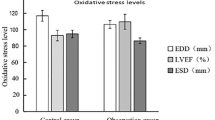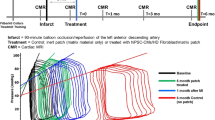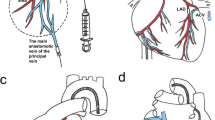Abstract
Hepatocyte growth factor (HGF) alleviates acute and chronic inflammation in experimental inflammatory bowel disease, glomerulonephritis, and airway inflammation. However, the anti-inflammatory effects of HGF on myocardial infarction are not defined. The current study assessed the anti-inflammatory effects of HGF in post-ischemic heart failure. The left anterior descending coronary artery was ligated in rats, and adenovirus containing human HGF (Ad-HGF) or control virus (Ad-GFP) was administered intramyocardially. The quantity of proinflammatory cytokines secreted by cardiomyocytes, such as tumor necrosis factor-α (TNF-α), interleukin-6 (IL-6), and IL-1β, was evaluated. Cardiac function and LV remodeling were assessed using echocardiography and collagen deposition, respectively. Left ventricular fractional shortening (LVFS) and left ventricular ejection fraction (LVEF) four weeks after injection were significantly increased in Ad-HGF-treated animals compared to the Ad-GFP group. HGF gene therapy improved ventricular geometry with a significantly decreased left ventricular end-diastolic diameter (LVEDD) and markedly reduced myocardial collagen deposition. Treatment with Ad-HGF significantly decreased the mRNA levels of TNF-α, IL-6, and IL-1β in the non-infarcted region four weeks after injection. Changes of the TNF-α, IL-6, and IL-1β levels in the non-infarcted region positively correlated with the LVEDD 4 weeks after infarction. Treatment of acute myocardial infarction (AMI) with Ad-HGF in the early stage of MI reduced the pro-inflammatory cytokine levels and preserved cardiac function. These findings indicated that Ad-HGF gene therapy alleviated ventricular remodeling after infarction by reducing inflammation.
Similar content being viewed by others
Log in or create a free account to read this content
Gain free access to this article, as well as selected content from this journal and more on nature.com
or
References
Ma Y, Zou H, Zhu XX, Pang J, Xu Q, Jin QY, et al. Transforming growth factor β: A potential biomarker and therapeutic target of ventricular remodeling. Oncotarget 2017; 8: 53780–90.
Nian M, Lee P, Khaper N, Liu P. Inflammatory cytokines and postmyocardial infarction remodeling. Circ Res 2004; 94: 1543–53.
Ono K, Matsumori A, Shioi T, Furukawa Y, Sasayama S. Cytokine gene expression after myocardial infarction in rat hearts: possible implication in left ventricular remodeling. Circulation 1998; 98: 149–56.
Arthur LG, Kuenzler KA, Schwartz MZ. Hepatocyte growth factor ameliorates inflammatory bowel disease in a rat model. J Gastrointest Surg 2003; 7: 1062–8.
Arthur LG, Schwartz MZ, Kuenzler KA, Birbe R. Hepatocyte growth factor treatment ameliorates diarrhea and bowel inflammation in a rat model of inflammatory bowel disease. J Pediatr Surg 2004; 39: 139–43.
Oh K, Iimuro Y, Takeuchi M, Kaneda Y, Iwasaki T, Terada N, et al. Ameliorating effect of hepatocyte growth factor on inflammatory bowel disease in a murine model. Am J Physiol Gastrointest Liver Physiol 2005; 288: G729–35.
Ohda Y, Hori K, Tomita T, Hida N, Kosaka T, Fukuda Y, et al. Effects of hepatocyte growth factor on rat inflammatory bowel disease models. Dig Dis Sci 2005; 50: 914–21.
Numata M, Ido A, Moriuchi A, Kim I, Tahara Y, Yamamoto S, et al. Hepatocyte growth factor facilitates the repair of large colonic ulcers in 2,4,6-trinitrobenzene sulfonic acid-induced colitis in rats. Inflamm Bowel Dis 2005; 11: 551–8.
Hanawa T, Suzuki K, Kawauchi Y, Takamura M, Yoneyama H, Han GD, et al. Attenuation of mouse acute colitis by naked hepatocyte growth factor gene transfer into the liver. J Gene Med 2006; 8: 623–35.
Ito W, Kanehiro A, Matsumoto K, Hirano A, Ono K, Maruyama H, et al. Hepatocyte growth factor attenuates airway hyperresponsiveness, inflammation, and remodeling. Am J Respir Cell Mol Biol 2005; 32: 268–80.
Rong SL, Wang XL, Zhang CY, Song ZH, Cui LH, He XF, et al. Transplantation of HGF gene- engineered skeletal myoblasts improve infarction recovery in a rat myocardial ischemia model. PLoS One 2017; 12: e0175807.
Li B, Liao YH, Cheng X, Ge H, Guo H, Wang M. Effects of carvedilol on cardiac cytokines expression and remodeling in rat with acute myocardial infarction. Int J Cardiol 2006; 111: 247–55.
Xiao X, Chang G, Liu J, Sun G, Liu L, Qin S, et al. Simvastatin ameliorates ventricular remodeling via the TGFβ1 signaling pathway in rats following myocardial infarction. Mol Med Rep 2016; 13: 5093–101.
Yang ZJ, Chen B, Sheng Z, Zhang DG, Jia EZ, Wang W, et al. Improvement of heart function in postinfarct heart failure swine models after hepatocyte growth factor gene transfer: comparison of low-, medium- and high-dose groups. Mol Biol Rep 2010; 37: 2075–81.
Sutton MG, Sharpe N. Left ventricular remodeling after myocardial infarction: pathophysiology and therapy. Circulation 2000; 101: 2981–8.
Konstam MA, Kramer DG, Patel AR, Maron MS, Udelson JE. Left ventricular remodeling in heart failure: current concepts in clinical significance and assessment. JACC Cardiovasc Imaging 2011; 4: 98–108.
Platis A, Yu Q, Moore D, Khojeini E, Tsau P, Larson D. The effect of daily administration of IL-18 on cardiac structure and function. Perfusion 2008; 23: 237–42.
Zhou SF, Yuan J, Liao MY, Xia N, Tang TT, Li JJ, et al. IL-17A promotes ventricular remodeling after myocardial. J Mol Med (Berl) 2014; 92: 1105–16.
Nakamura T, Sakai K, Nakamura T, Matsumoto K. Hepatocyte growth factor twenty years on: Much more than a growth factor. J Gastroenterol Hepatol 2011; 26 Suppl 1: 188–202.
Jayasankar V, Woo YJ, Bish LT, Pirolli TJ, Chatterjee S, Berry MF, et al. Gene transfer of hepatocyte growth factor attenuates postinfarction heart failure. Circulation 2003; 108 Suppl 1: II230–6.
Duan HF, Wu CT, Wu DL, Lu Y, Liu HJ, Ha XQ, et al. Treatment of myocardial ischemia with bone marrow-derived mesenchymal stem cells overexpressing hepatocyte growth factor. Mol Ther 2003; 8: 467–74.
Madonna R, Cevik C, Nasser M, De Caterina R. Hepatocyte growth factor: molecular biomarker and player in cardioprotection and cardiovascular regeneration. Thromb Haemost 2012; 107: 656–61.
Nakamura T, Mizuno S, Matsumoto K, Sawa Y, Matsuda H, Nakamura T. Myocardial protection from ischemia/reperfusion injury by endogenous and exogenous HGF. J Clin Invest 2000; 106: 1511–9.
Futamatsu H, Suzuki J, Mizuno S, Koga N, Adachi S, Kosuge H, et al. Hepatocyte growth factor ameliorates the progression of experimental autoimmune myocarditis: a potential role for induction of T helper 2 cytokines. Circ Res 2005; 96: 823–30.
Mizuno S, Kurosawa T, Matsumoto K, Mizuno-Horikawa Y, Okamoto M, Nakamura T. Hepatocyte growth factor prevents renal fibrosis and dysfunction in a mouse model of chronic renal disease. J Clin Invest 1998; 101: 1827–34.
Gong R, Rifai A, Dworkin LD. Anti-inflammatory effect of hepatocyte growth factor in chronic kidney disease: targeting the inflamed vascular endothelium. J Am Soc Nephrol 2006; 17: 2464–73.
Okunishi K, Dohi M, Fujio K, Nakagome K, Tabata Y, Okasora T, et al. Hepatocyte growth factor significantly suppresses collagen-induced arthritis in mice. J Immunol 2007; 179: 5504–13.
Mizuno S, Matsumoto K, Li MY, Nakamura T. HGF reduces advancing lungfibrosis in mice: a potential role for MMP-dependent myofibroblast apoptosis. FASEB J 2005; 19: 580–2.
Kuroiwa T, Kakishita E, Hamano T, Kataoka Y, Seto Y, Iwata N, et al. Hepatocyte growth factor ameliorates acute graft-versus-host disease and promotes hematopoietic function. J Clin Invest 2001; 107: 1365–73.
Acknowledgements
This work was supported by the National Natural Science Foundation of China (No 81441014 to BL), the Shanxi Province Natural Science Foundation (No 2012011040-3 to XLW, 2013011049-4 to SLR), the Scientific Research Foundation of High Education Institutions of Shanxi Province (No 200811034 to SLR), the Research Project of Shanxi Provincial Health and Family Planning Commission (201602026 to SLR, 201602028 to XLW), the High School 131 Leading Talent Project of Shanxi Province to SLR, and the National Undergraduate Innovation and Entrepreneurship Training Programs (201610117001 to SLR). The funders had no role in the study design, data collection or analysis, decision to publish, or preparation of the manuscript.
Author information
Authors and Affiliations
Corresponding authors
Rights and permissions
About this article
Cite this article
Rong, Sl., Wang, Xl., Wang, Yc. et al. Anti-inflammatory activities of hepatocyte growth factor in post-ischemic heart failure. Acta Pharmacol Sin 39, 1613–1621 (2018). https://doi.org/10.1038/aps.2018.14
Received:
Accepted:
Published:
Version of record:
Issue date:
DOI: https://doi.org/10.1038/aps.2018.14
Keywords
This article is cited by
-
Anti-inflammatory Prowess of endothelial progenitor cells in the realm of biology and medicine
npj Regenerative Medicine (2024)
-
Therapeutic angiogenesis and tissue revascularization in ischemic vascular disease
Journal of Biological Engineering (2023)
-
Donor heart preservation with hypoxic-conditioned medium-derived from bone marrow mesenchymal stem cells improves cardiac function in a heart transplantation model
Stem Cell Research & Therapy (2021)
-
Microvesicles derived from human umbilical cord mesenchyme promote M2 macrophage polarization and ameliorate renal fibrosis following partial nephrectomy via hepatocyte growth factor
Human Cell (2021)
-
The role of hepatocyte growth factor in mesenchymal stem cell-induced recovery in spinal cord injured rats
Stem Cell Research & Therapy (2020)



